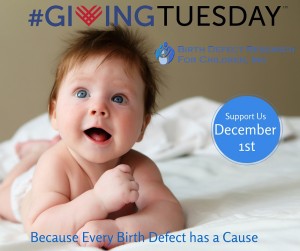On December 1st, Birth Defect Research for Children (BDRC) is joining charities, businesses and families around the world for a global day of giving. On this day the world will come together for one common purpose: to celebrate generosity and to give. Will you join us?
Donate NowHere’s what you are supporting when you give to BDRC:
- We developed and operate the National Birth Defect Registry.
- National Birth Defect Registry data have been used to evaluate national birth defect issues: ·
- Registry data have found a consistent pattern of increases in immune, endocrine, skin, allergic, attention and learning problems in the children of Vietnam veterans exposed to Agent Orange.
- BDRC was the first organization to find an increase in a rare craniofacial defect in the children of Gulf War veterans. This increase was later confirmed by a Department of Defence study.
- BDRC assisted the community of Dickson, Tennessee in identifying a cluster of cleft palate cases associated with a solvent (TCE) leaking into their water supply from an old landfill. This resulted in capping the landfill, moving the source of community water and warning residents not to drink well water.
- The United Steelworkers asked BDRC to review birth defect data from Joplin, MO. The incidence of birth defects in Joplin was higher than the county and the state of Missouri. BDRC’s review found that there were significant increases in certain categories of birth defects especially Atrial Septal Defects of the heart.
- BDRC collaborated with a doctor at the University of Texas on study of a stomach defect (gastroschisis) that is increasing around the world. Registry data showed an association between gastroschisis and younger mothers who used recreational drugs and/or drank alcohol.
- BDRC found an association between Autism Spectrum Disorders in the registry and structural birth defects in 60% of the cases analyzed. This suggests a prenatal cause in these cases.
Through the registry, Birth Defect Research for Children also offers a parent-matching program that links families who have children with similar birth defects. Parents are sent lists of other children who have the same or similar birth defects to those of their child.
Every year , we provide hundreds of fact sheets each month to parents looking for information about their child’s birth defects. We also offer “how to” guides and fact sheets on some major environmental causes of birth defects.
BDRC has a comprehensive online Healthy Baby Resource where prospective parents can learn all about how to have a healthier baby.
Your support on Giving Tuesday helps us study the link between birth defects and prenatal and preconceptual exposures of both the mother and the father.
Your support on Giving Tuesday will also provide families with birth defect information, resources and support.
Your support on Giving Tuesday can help us find the causes of a birth defects. Click the red “Donate Now” button to make your gift.
Thank you for your support.



